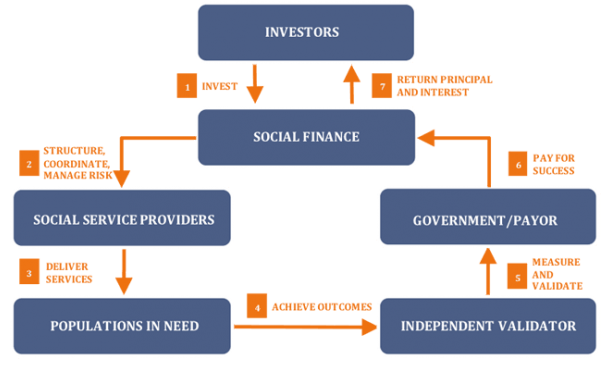

Impact Investments, Public Safety & Reentry
Today’s news out of London on the success of the world’s first Social Impact Bond (SIB) validates what we believed from the start — the alignment of social and financial outcomes is a powerful force for good.
The Peterborough SIB reduced reoffending of short-sentenced offenders by 9%, exceeding the target of 7.5% set by the contract with the UK Ministry of Justice. As a result, the 17 investors in the Peterborough Social Impact Bond will receive a single payment representing their initial capital plus an amount that will represent a return of just over 3% per annum for the period of investment.
These results are a testament to our collective commitment to this new public finance tool which aims to deliver measurable results and improve people’s lives. It demonstrates that it is indeed possible for investors to benefit when society does.
In 2010, when our sister organization Social Finance UK pioneered the Social Impact Bond in Peterborough, they faced a persistent challenge: how to stem reoffending of short-sentenced offenders.
The solution was simple and elegant: to unite uncommon parties — private investors, government and nonprofits — around a common goal: improving outcomes for individuals and driving measurable, lasting results for communities.
When the project launched seven years ago there were, understandably, more questions than answers: could SIBs (Pay for Success projects, as we call them here) work in the US? What were the key components to building projects that would have positive outcomes and measurable, enduring impact on peoples’ lives? Was it possible to bring the capital markets, the social sector and the government together around achieving specific social outcomes? How could we ensure that the introduction of a profit motive into civil society work would be force for good, not a road to unintended consequences? What did we need to do to get it right?
We founded Social Finance US because we were energized by the tool’s potential to change lives for the better. Pay for Success is a distinctive type of impact investment, where returns are generated by creating greater efficiency within governments. Pay for Success shifts the way policymakers allocate scarce resources — helping make government work better for people.
The promise of the model to respond to social challenges is far reaching. Six years in with a US market of 17 projects mobilizing over $200M in capital, the power of the PFS model reaches across borders, issue areas, policy contexts, and sectors. Increasingly, we believe the model works.
In our projects from Massachusetts to South Carolina, from New York to Oklahoma and California and Connecticut and beyond — the ripple effect of our work is wide, and it is deep.
And while we are encouraged by the tremendous progress that has been made both in the UK, the US and globally since Peterborough launched, we also realize it is the first phase in the long arc of building a movement.
Of course we know there is no guarantee that Pay for Success projects will create the social impact they intend. There are risks involved. It is the transfer of risk from the public sector to the private sector that makes this model so meaningful for government.
We and our fellow travelers in the PFS movement continue to build and nurture the field, and to refine and expand the model. And we continue to learn and be inspired by the efforts of our colleagues.
It will take another decade or more to know whether Pay for Success will achieve the level of change we seek. We believe it can reorient the way governments allocate resources toward outcomes and that it can mobilize private capital to accelerate that transition. Until then, each project brings us an opportunity to serve more people, collaborate with new partners and gain more knowledge to assess and refine the model.
Even so, today’s news brings us one step closer to this goal. In a time of global change and uncertainty, Pay for Success is one part of the solution. Robert F. Kennedy once said of the GDP that “it measures everything in short, except that which makes life worthwhile.”
It is difficult to measure social progress. We can measure capital invested, projects launched, and people served. But the real question is — how do you measure a life better lived?
Pay for Success is one public finance tool to do that — and following today’s positive news on Peterborough — we are eager to write the next chapter of Pay for Success.
Related Insight

A New Tool for Scaling Impact: How Social Impact Bonds Can Mobilize Private Capital to Advance Social Good
In September 2010, our sister organization, Social Finance, Ltd., launched the world’s first Social Impact Bond in the United Kingdom. Targeted at reducing prison recidivism, the Peterborough pilot generated world-wide interest in the potential of…

A Strong Field Framework for Social Impact Bonds
This article from the Stanford Social Innovation Review explores the strengths and weaknesses of the U.S. Social Impact Bond field and highlights how the field can solidify Social Impact Bonds as a practical financial tool.

Financing Outcomes Through Social Impact Bonds
This chapter of What Matters: Investing in Results to Build Strong, Vibrant Communities was written by Social Finance CEO Tracy Palandjian.